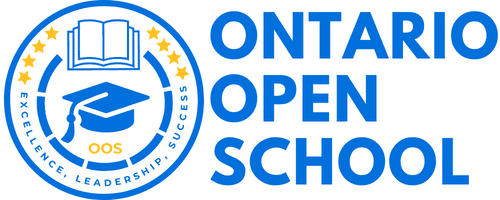- info@ontarioopenschool.com
- 647-494-4499
-
Unit 100 - 29 Gervais Drive, North York, ON.
M3C 1Y9
Copyright 2024 Ontario Open School Inc. All Rights Reserved.
This course focuses on the development of leadership skills used in managing a successful business. Students will analyse the role of a leader in business, with a focus on decision-making, management of group dynamics, workplace stress and conflict, motivation of employees, and planning. Effective business communication skills, ethics, and social responsibility are also emphasized.
Unit Order | Unit Name | Suggested Time |
|---|---|---|
| Unit 1 | Foundations of Management: Students identify and describe management roles, and summarize managerial responsibilities, competencies, and skills. Major management theories are described, analyzed, and evaluated. Students investigate ethical issues, social responsibility, and organizational codes of ethics to end this unit. Students will analyze the social, ethical, and environmental implications of financial decisions while understanding how the for-profit industry operates. | 22 hours |
| Unit 2 | Planning: Students are given the opportunity to: analyse the importance of proper planning in a variety of economic and financial scenarios facing an organization; apply creativity, effective problem solving, and decision making in addressing an organization’s human resources; apply appropriate planning theories and strategies to a variety of situations; and analyse the relationships between strategic planning and the success for an organization. Students demonstrate an understanding of how evaluation techniques relate to the managerial process, identify the factors affecting individual and group performance, and explain the strategies used by managers to manage human resources. | 22 hours |
| Unit 3 | Organizing and Controlling: Students are given the opportunity to: demonstrate an understanding of the various organizational structures used to manage the workforce effectively; identify and describe the ways in which organizational structures have changed to adapt to the changing nature of work; and demonstrate an understanding of staffing issues. Students explain the nature and importance of performance appraisal and compare major performance appraisal methods and techniques. The teacher and students investigate compensation, benefit and discipline systems, and the relationship between high-performance activities and increased job satisfaction.
| 22 hours |
| Unit 4 | Leading: This unit provides students with opportunities to apply theories of human behaviour to understand how individuals and groups function in the workplace. Students will then connect these theories to motivational techniques used in the workplace by managers. Students will also apply teamwork and group dynamics to carry out projects and solve problems. Students demonstrate the use of proper leadership techniques in a variety of situations. | 21 hours |
| Unit 5 | Unit 5: Management Challenges: Students analyse the elements that bring about change, the reason for various attitudes towards change, and the major challenges facing organizations, and evaluate strategies used to implement change. Students will demonstrate the use of appropriate communication techniques related to business management. Finally, students evaluate the strategies used by individuals and organizations to manage stress and conflict while comparing a variety of theories about how to motivate individuals and teams in a productive work environment. Students complete this unit of study by researching a career in management. | 15 hours |
| Final Evaluation 30% | Final Project Final Exam | 6 hours 2 hours |
| Total | 110 hours |
A wide variety of instructional strategies are used to provide learning opportunities to accommodate a variety of learning styles, interests and ability levels. These strategies include, but are not limited to:
|
Structured Overview |
|
Audi/Video Lecture |
|
Learning Log |
|
Discussion |
|
Directed Reading/ Thinking Activities |
|
Case Study |
|
Reflective Discussion |
|
Internet Technologies |
|
Mind Map |
|
Portfolio |
|
Media Presentation |
|
Writing to Learn |
|
Role-Play |
|
Reading |
|
Case Studies |
|
Structured Discussion |
|
Brainstorming |
|
Conference |
|
Group Work/Pair Work |
Purpose
The primary purpose of assessment is to improve student learning. Assessment relates directly to the expectations for the course.
A variety of assessments for and as learning are conducted on a regular basis to allow ample opportunities for students to improve and ultimately demonstrate their full range of learning and for the teacher to gather information to provide feedback. Assessment tasks relate to the success criteria set out in lesson plans. Success criteria allow students to see what quality looks like.
Evaluation is the process of judging the quality of student work in relation to the achievement chart categories and criteria and assigning a percentage grade to represent that quality. Evaluation is based on gathering evidence of student achievement through:
Assessment for Learning – we provide feedback and coaching. Assessment FOR Learning is the process of seeking and interpreting evidence for the use of learners and their teachers to decide where the learners are in their learning, where they need to go, and how best to go there.
Assessment as Learning – we help students monitor progress, set goals, reflect on their learning
Assessment AS Learning is the process of the explicit fostering of students’ capacity over time to be their own best assessors, but teachers need to start by presenting and modeling external, structured opportunities for students to assess themselves.
Assessment of Learning – we use assessments to provide evaluative statements about student achievement. Assessment OF Learning is the assessment that becomes public and results in statements of symbols
(marks/grades/levels of achievement) about how well students are learning. It often contributes to pivotal decisions that will affect students’ future.
ASSESSMENT TOOLS
| Units | Duration | Overall Expectation | AFL | AAL | AOL | Assessed Categories | ||||
| K
25% |
I
25% |
C
25% |
A 25% |
|||||||
|
70%
|
A | 20 hours | A1-A3 | Homework/ worksheet
Class Discussion
|
KWL Chart
Agenda
|
-Management Report and Presentation
-CSR debate |
x | x | x | x |
| B | 20 hours | B1-B3 | Assigned Questions
Discussion
|
Learning Log
My True Color Test |
-Personality assignment
-Leadership in the movies |
x | x | x | x | |
| C | 25 hours | C1-C3 | -Conflict Scenario -Work Place Ethics
-Volkswagen Deception Questions |
Conflict management Quiz
KWL Chart
|
-Assignment
-Corporate Scandal |
x | x | x | x | |
| D | 20 hours | D1-D5 | Homework
Discussion
|
Self-Assessment
Glossary making |
-Leadership storyboard
-Strategic Planning Assignment
|
x | x | x | x | |
| E | 15 hours | E1-E3 | Discussion | Student-Teacher Conferencing
-KWL Chart |
-Unit Test
-Assignment
|
x | x | x | x | |
| 30 % | Final Exam | A1-E3 | Final Exam | x | x | x | x | |||
Resources
Growing Success: Assessment, Evaluation and Reporting in Ontario Schools (2010)
http://www.edu.gov.on.ca/eng/policyfunding/growSuccess.pdf
theory, the difference between leadership and management, and various leadership styles. – http://albie.wcupa.edu/ttreadwell/group4/99spring/mar-may/messages/155.html
Grading
Weighting of categories
| Knowledge/Understanding | Thinking/Inquiry | Communication | Application |
| 25% | 25% | 25% | 25% |

Course Grade | Grade 12 |
|---|---|
Course Code | BOH4M |
Course Category | Business Studies |
Course Type | University/College Preparation |
Course Delivery | Online |
Course Duration | 110h |
Course Credit | 1.00 |
Copyright 2024 Ontario Open School Inc. All Rights Reserved.
